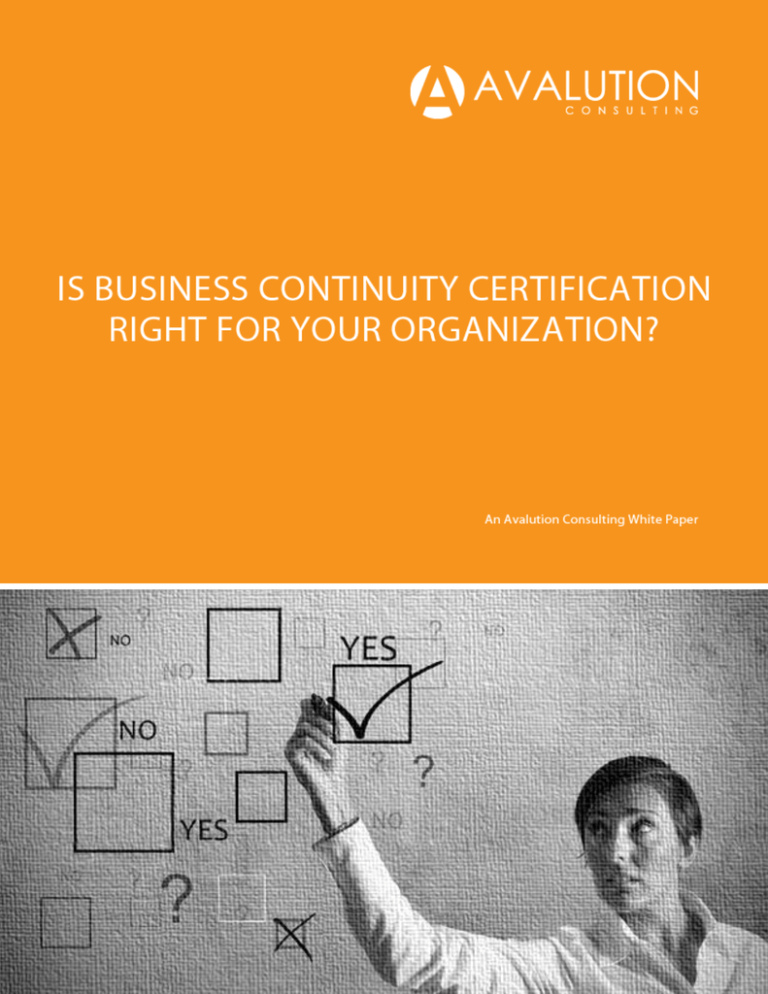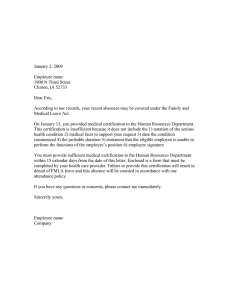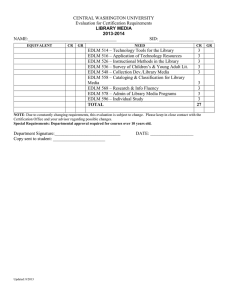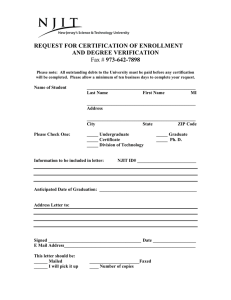
Is Business Continuity Certification Right for Your Organization?
©2008-2013 AVALUTION CONSULTING, LLC | ALL RIGHTS RESERVED
i
Is Business Continuity Certification Right for Your Organization?
This white paper analyzes the business case for pursuing organizational business
continuity certification, including what it takes to complete the certification
process and how best to begin preparing.
For information specific to ISO 22301 organizational certification, check out our
newest white paper: Implementing ISO 22301.
CONTENTS
Key Terms Defined..............................................................................................................................................3
What is the Value of Certification?.....................................................................................................................4
What Organizational Certifications are Available? .............................................................................................5
What to Certify? .................................................................................................................................................7
What’s Required to Complete the Certification Process? ..................................................................................7
How to Begin Preparing for Certification? .........................................................................................................8
What are Alternatives to Certification?..............................................................................................................9
Conclusions .........................................................................................................................................................9
Let's Connect ......................................................................................................................................................9
About Avalution Consulting ..............................................................................................................................10
©2008-2013 AVALUTION CONSULTING, LLC | ALL RIGHTS RESERVED
ii
Is Business Continuity Certification Right for Your Organization?
As the business continuity management discipline matured over the past twenty years, governmental and
standards development organizations created and introduced numerous regulatory requirements and standards
– some with optional certification offerings. Private sector organizations develop business continuity solutions
based on these regulatory requirements and standards to gain business advantages ranging from compliance
and competitive positioning to satisfying aggressive customer demands.
Whether responding to a customer inquiry or request from internal management, most business continuity
professionals struggle to clearly demonstrate their organization’s competency. A potential solution to this
problem is an organizational certification based on a comprehensive and generally-accepted standard.
This white paper analyzes the business case for pursuing organizational business continuity certification,
including what it takes to complete the certification process and how best to begin preparing.
KEY TERMS DEFINED
While business continuity certification is relatively new,
many organizations are familiar with other forms of valueadding certification that commonly focus on quality,
security, and safety (i.e. ISO 9001 and ISO 27001). No
matter the focus, certification is centered on consensusbased standards that almost always leverage management
system concepts. So what do all these terms really mean?
Numerous business continuity standards
and regulations exist, including those
authored by the following organizations:
British Standards Institute (BSI)
International Organization for
Standardization (ISO)
ASIS International
National Fire Protection Association
(NFPA)
Federal Financial Institutions
Examination Council (FFIEC)
A standard is a collection of best practices and guidelines
developed collaboratively in a consensus-driven process,
which is overseen by an accredited standards development
organization (SDO). Standards are evolutionary, meaning
they are created based on a formal process and revisited
and revised at regular intervals. Although compliance with
standards is voluntary, meaning organizations can choose to
Learn More About Business Continuity
model programs based on the content, some are written for
Standards & Requirements
certification and known as “technical specifications” or
“requirements documents”. By adopting recognized
standards, like those outlined in this white paper,
organizations demonstrate that they are committed to operational excellence that can help stimulate industry
competition and market leadership.
Unlike standards that organizations may voluntarily choose to adopt, regulations (a.k.a rules) exist in nearly all
industries in order to ensure consistency in product/service delivery and protect stakeholders. Typically created
and enforced by a government or trade association, regulations specify mandatory requirements that must be
met under specific laws in order to legally operate and engage in business activity.
Numerous organizations, including BSI, NFPA, ASIS International and ISO, embrace management systems, which
is a concept relatively new to the business continuity profession. A management system is the framework of
processes and procedures used to ensure that an organization can fulfill all tasks required to achieve a set of
related business objectives. Management system standards provide a model for setting up and operating a
management system that focuses on several characteristics specifically applicable to business continuity:
accountability, repeatable processes, competencies, resources, performance management and review, and
cultural change. Check out this short video for more information: Business Continuity Management Systems.
©2008-2013 AVALUTION CONSULTING, LLC | ALL RIGHTS RESERVED
3
Is Business Continuity Certification Right for Your Organization?
WHAT IS THE VALUE OF CERTIFICATION?
Business continuity remains a fragmented discipline, with solutions implemented based on diverse business
requirements and influenced by numerous standards, regulations, and other obligations. Certification to an
accepted standard provides an objective measure of an organization’s approach to preparedness and removes
doubt concerning the quality of business continuity planning efforts. Certification may add value to your
organization in the following four ways:
1. Certification provides organizations with a strong competitive differentiator and potential customers
with the means to make a solid, straightforward comparison between organizations. For existing
customers, certification can provide a degree of assurance, which is critically important if the
organization is operating as a single or sole source provider of a critical product or service and
customers have expressed concern and are evaluating secondary sources.
2. Related to competitive differentiation, certification provides a convenient and efficient response
process to frequent business continuity surveys and inquiries from customers, as well as regulators,
investors, and insurance carriers. With the existence of a third-party registered certification, there is
less of a need to share proprietary planning information to satisfy continuity inquires and concerns.
Certification may soon begin to offer direct cost-savings opportunities on a recurring basis. Industry
associations are in the process of debating the direct benefits of “viable” business continuity planning
approaches and solutions on credit ratings and business interruption insurance premiums.
3. The organizational certification process also
introduces discipline, holding the organization
accountable to consistent focus and participation in
a life-cycle oriented business continuity planning
effort. With employee turnover always a concern,
organizational certification (and the inherent
requirements that mandate management system
documentation,
accountability,
repeatability,
continual improvement, and evidence) will enable an
effective knowledge transfer process.
With the existence of a thirdparty registered certification,
there is less of a need to
share proprietary planning
information to satisfy
continuity inquires or
concerns.
4. From an internal perspective, developing business
continuity processes and capabilities in accordance
with a standard provides the business continuity
planning process owner with the ability to easily and
confidently answer management questions regarding
the state of the preparedness effort. Questions such as “What’s everyone else doing?” or “Are we doing
everything we should be?” can be clearly quantified and answered through reference to the standard.
Business continuity weaknesses and non-conformities will be highlighted during initial and continuing
certification audits, which can then be addressed to show progress toward a higher level of
preparedness. Additionally, for organizations with decentralized business continuity planning processes,
audits will encourage compliance, ensure conformity across the organization, and act as a catalyst for
continuous improvement.
While certification can add value to an organization, it may not be the appropriate
choice for your organization. Review Table 1 to determine if your organization
should consider business continuity certification.
©2008-2013 AVALUTION CONSULTING, LLC | ALL RIGHTS RESERVED
4
Is Business Continuity Certification Right for Your Organization?
Table 1 – Determining if Certification is Right for Your Organization
Criteria Influencing The Certification Decision-Making Process
Customer Demand
You are a single or sole source provider and wish to retain that status.
Differentiation in the Marketplace
Your business development team feels that business continuity capabilities may be a competitive
differentiator in your marketplace, and your leadership team desires to increase market share.
Cost Savings Opportunities
A proven business continuity management capability may provide business interruption premium savings
or influence more favorable credit ratings.
Senior Leadership Inquiries
Management displays a strong interest in business continuity readiness or requests benchmarking data or
third party attestation to confirm the viability of the investment made to date. They may also want
answers to the following questions, which alignment to a standard or certification may help answer:
What is everyone else doing?
Are we doing everything we should be doing?
What are our primary program weaknesses?
Certification can add value, but more importantly, adopting and leveraging standards can contribute to
improved performance in most cases. By simply adopting standards, even without certification, organizations
will realize value in three key areas:
Maintain Focus
The business continuity planning team will achieve continuous commitment (and improvement) where
the business participates in planning and plan maintenance efforts.
Manage Risk
In a prioritized manner and consistent with organizational strategy, the business will proactively manage
risk instead of simply reacting to it.
Integrate Processes
The organization will benefit from a greater understanding of business continuity as it integrates
preparedness into all critical business processes.
WHAT ORGANIZATIONAL CERTIFICATIONS ARE AVAILABLE?
Several business continuity-related certification programs are currently available. Determining which
certification is right for an organization depends on the organization’s industry and operational goals. Table 2
highlights three standards that offer an optional path toward organizational certification. The table also
provides guidance on which would be the most appropriate, depending on an organization’s characteristics and
business objectives.
©2008-2013 AVALUTION CONSULTING, LLC | ALL RIGHTS RESERVED
5
Is Business Continuity Certification Right for Your Organization?
Table 2 – Current Organizational Certification Options
Title
Description
Status
Application
Reason
ISO 22301
The first international standard
focused exclusively on business
continuity.
Available as
of May 2012
All organizations,
regardless of industry,
size, or location
Organizations looking to
establish, operate, and
continuously improve a
business continuity
management system (BCMS).
Emergency
Management
Accreditation
Program (EMAP)
Certification process focused on
assisting local governments with
developing and measuring the
effectiveness of emergency
management strategies.
Available as
of September
2007
U.S. state and local
governments
Government leaders are
interested in measuring
progress toward an actionable
response and recovery
strategy.
ISO 27001
Information security management
system certification program
which includes content that
addresses business continuity and
disaster recovery
Available as
of April 2006
Organizations seeking
certification of
security processes,
with a “minor” in
business continuity
Primary business driver is an
interest in security program
enhancement and certification
(BS 25999 was written to offer
a more expansive look at
business continuity as an
extension of ISO 27001)
In addition to the standards or programs listed above that could lead to organizational certification, one
additional U.S. government-charted program is available that could lead to certification: Private Sector
Preparedness Accreditation and Certification Program, or PS-Prep.
Private Sector Preparedness Accreditation and Certification Program (PS-Prep)
Title IX of Public Law 110-53 details the Voluntary Private Sector Preparedness Accreditation and Certification
Program. Title IX mandated that the U.S. Department of Homeland Security (DHS) develop and implement a
voluntary preparedness certification program that promotes private sector preparedness. On June 15, 2010, DHS
published a notice in the Federal Register noting the selection of three standards for initial inclusion in the PSPrep Program (PS-Prep does not include a provision to develop any new standards, but rather to adopt existing
or newly-developed standards that meet certain criteria):
ASIS International SPC.1-2009
British Standard 25999-2:2007
National Fire Protection Association 1600: 2007/2010
With these selections, the ANSI-ASQ National Accreditation Board (ANAB) worked to structure an organizational
certification program. In order to launch the organizational certification effort, ANAB finalized the
audit/certification approach (which included a public comment period) and identified qualified audit firms that
could evaluate private sector organizational readiness for certification. PS-Prep certification is now available for
each of the three selected standards, and Avalution expects that DHS will eventually add ISO 22301 (Societal
security – Business continuity management systems – Requirements) and possibly other American National
Standards and ISO Standards that meet the original selection criteria. Such additions may include ASIS/BSI
BCM.01-2010 (Business Continuity Management Systems: Requirements with Guidance for Use) or ISO 22320
(Societal security – Emergency management – Requirements for incident response).
©2008-2013 AVALUTION CONSULTING, LLC | ALL RIGHTS RESERVED
6
Is Business Continuity Certification Right for Your Organization?
WHAT TO CERTIFY?
Generally speaking, most certification registrars offer specific guidelines as to the scope of the certification
process. For example, an organization can achieve ISO 22301 certification for any of the following:
The organization as a whole;
A location; or
A business unit.
However, in this context, a specific product or service cannot be the scope of a certification effort.
Table 3 outlines the three certification scope options mentioned above and the suggested criteria to
assist in decision making.
Table 3 – ISO 22301 Certification Scope Options
Scope
Criteria To Influence Scoping
Enterprise Wide
The organization is tightly integrated and it is nearly impossible to
differentiate or remove less critical locations or lines of business from
the certification process. Additionally, all aspects of the organization
follow the spirit and intent of the standard consistently.
Location
Senior management (or a customer) is able to pinpoint specific
locations deemed critical to product or service delivery and/or are
material to the organization’s well-being. Select locations are chosen
if a finite number of facilities offer competitive differentiation and
align to a stakeholder’s specific expectation.
Line of Business
Senior management (or a customer) is able to pinpoint specific lines of
business where competitive differentiation is possible or where
certification should be pursued.
Overall, careful consideration should be given to not only the value of working toward organizational
certification, but also to what the scope of the certification should be. This decision-making process impacts the
value of the certification, as well as the cost associated with obtaining the certification. Starting with a smaller
scope may be a way to begin exploring the value of certification with lower costs. However, it is important that
differentiation between program elements across the organization is avoided.
View Scoping an Organizational Certification Effort for more information on this topic.
WHAT’S REQUIRED TO COMPLETE THE CERTIFICATION PROCESS?
For most standards, preparing for certification requires time, effort, focus, and commitment – no matter how
ready one may feel their organization is for disruptive events. Avalution identified five key success factors that
can ease the preparation process. These success factors are:
Management commitment to develop, operate, and continuously improve the Business Continuity
Management System (BCMS)
Time and resource commitment necessary to meet the requirements noted in the standard
©2008-2013 AVALUTION CONSULTING, LLC | ALL RIGHTS RESERVED
7
Is Business Continuity Certification Right for Your Organization?
Time commitment to participate in the audit process, providing documentation and answering examiner
inquires
Time and resource commitment necessary to address audit issues (non-conformities)
Budget commitment for audit fees, which includes the first assessment, as well as recurring surveillance
audits throughout the certification period
The success factor that most organizations underestimate is the time commitment to prepare documentation for
the audit process. Although it is not typically the most time-consuming activity, it is rare that an organization
developed this type of documentation thoroughly or in line with the requirements noted in a specific standard.
In order to prove compliance, the certifying entity requires detailed, descriptive documentation. This
documentation must show how the organization meets the spirit or intent of the standard, how the organization
delivers repeatable outcomes when compared to its unique BCMS, and how management approves analyses,
strategies and test results (to name a few).
HOW TO BEGIN PREPARING FOR CERTIFICATION?
For some organizations, particularly those new to business continuity, preparation will take time and resources.
However, whether your organization is new to business continuity or one that maintains effective response and
recovery solutions, consider each of the following ten points as you prepare for organizational certification.
1. Identify the most appropriate standard and certification process. Obtain a copy of the standard and any
material that provides assistance with the certification process, and review carefully for organizational
alignment.
2. Develop the certification value proposition and begin “selling” to those who may benefit most from
organization certification (sales, strategic planners, supply chain, and executive management).
3. Determine the appropriate scope of certification.
4. Develop a project plan/program charter to prepare for certification. This activity will clarify the time
investment and resources necessary to ensure a successful outcome. Gain approval and support from
key management personnel.
5. Develop program documentation consistent with the standard, including a policy, standard operating
procedures, scope statement and objectives listing.
6. Perform required activities resulting from new processes outlined in the program documentation. Some
organizations may be able to move forward to the next step, a self-assessment, prior to beginning any
new program activities.
7. Perform a self-assessment or identify a qualified firm to perform a certification readiness assessment,
specific to the scope of the certification you’re planning to pursue.
8. Perform any or all aspects of your BCMS required to close the gaps identified during the assessment.
For organizations with mature business continuity processes, this may include re-performing activities
so they align with the standard’s requirements or so the proper documentation is completed to prove
compliance.
9. Ensure all major gaps have been closed, and ensure the organization has a strong corrective actions
handling process to address future improvement opportunities or compliance issues.
10. Develop an RFP and submit to a registrar, confirming scope and resource requirements. Schedule the
certification process with the certifying body when management feels ready.
Note: We recently released a white paper focused on aligning or certifying to ISO 22301, the first international
standard focused exclusively on business continuity. Implementing ISO 22301 breaks the standard down section
by section, discussing what each clause means, the value it delivers, recommended approaches for alignment,
and items to consider before moving forward. You can download a free copy via the link above.
©2008-2013 AVALUTION CONSULTING, LLC | ALL RIGHTS RESERVED
8
Is Business Continuity Certification Right for Your Organization?
WHAT ARE ALTERNATIVES TO CERTIFICATION?
It is important to note that standards exist first and foremost to improve performance, and second to enable
certification where it makes business sense. Organizations that choose not to pursue certification can still
achieve value by embracing the standards outlined in this white paper. Additionally, internal and external
program assessments or “audits” can provide organizations with actionable feedback related to program
improvement and organizational preparedness.
Internal program assessments may be completed by management or other internal, “disinterested”
(independent) departments, including internal audit, compliance, risk, or even the business continuity team.
These assessments should ensure that the program is meeting identified organizational objectives based on one
or more standards, including proper alignment, implementation, and maintenance.
External program assessments should be conducted by business continuity professionals who carry accreditation
from a certifying organization such as the Business Continuity Institute or DRI International. In addition, some
consulting firms have aligned themselves with particular standards and have received accreditation that certifies
their knowledge of the standard and their ability to conduct external program assessments against that
standard.
CONCLUSIONS
Organizational business continuity certification can offer the opportunity for market differentiation, cost savings,
and increased levels of program readiness for organizations of all sizes and in all industries. Upon certification,
organizations may realize a competitive advantage within their industry by displaying this commitment to
preparedness. Similarly, certified organizations should demand the same level of commitment from their supply
chain partners and share preparedness standards, concepts, and techniques in order to achieve higher levels of
preparedness.
Outside of business continuity certification, organizations that embrace the standards outlined in this document
will be able to improve their processes and performance while increasing the value they deliver to themselves
and to external business partners.
LET'S CONNECT
Avalution has been a longtime proponent of standards, and, if a business case exists, proceeding toward
organizational certification. We encourage you to review the resources provided in this white paper and invite
you to reach out to us with any questions, as our team always welcomes a conversation about how certification
or alignment to a standard can benefit your organization.
866.533.0575 | contactus@avalution.com | avalution.com
©2008-2013 AVALUTION CONSULTING, LLC | ALL RIGHTS RESERVED
9
Is Business Continuity Certification Right for Your Organization?
ABOUT AVALUTION CONSULTING
Avalution Consulting – the 2012 BCI North America Business Continuity/Disaster Recovery Company of the Year
– specializes in business continuity and IT disaster recovery consulting, outsourcing, and software solutions for
organizations in both the public and private sectors. Avalution also assists in preparing organizations for ISO
22301 certification, as well as assessing readiness for the certification process. Headquartered in Cleveland, Ohio
(USA), Avalution is an ISO 22301 certified firm and maintains a contract on GSA Schedule 70. In addition to
consulting services, Avalution offers two unique, web-based business continuity software solutions:
Catalyst business continuity software combines a simple user interface and on-screen guides with Avalution’s
industry-leading methodology to make continuity planning easy and repeatable for every organization,
regardless of size, industry, or geography. Features include policy and procedure development, business impact
analysis, risk assessment, recovery strategy definition, plan development (business and IT), exercising, live
incident management, and emergency notification. No long-term contracts are required, and a 30-day free trial
is available via the website.
The Planning Portal – an enterprise level solution based on the simplicity of Microsoft SharePoint 2010 – delivers
highly customizable tools and processes to assist in managing and executing business continuity and IT disaster
recovery programs. Solutions address analysis, planning, awareness generation, exercise planning, notification,
live crisis management, and continuous improvement. Demonstrations are available upon request.
866.533.0575 | avalution.com | theplanningportal.com | bccatalyst.com | Follow Us:
©2008-2013 AVALUTION CONSULTING, LLC | ALL RIGHTS RESERVED
10




